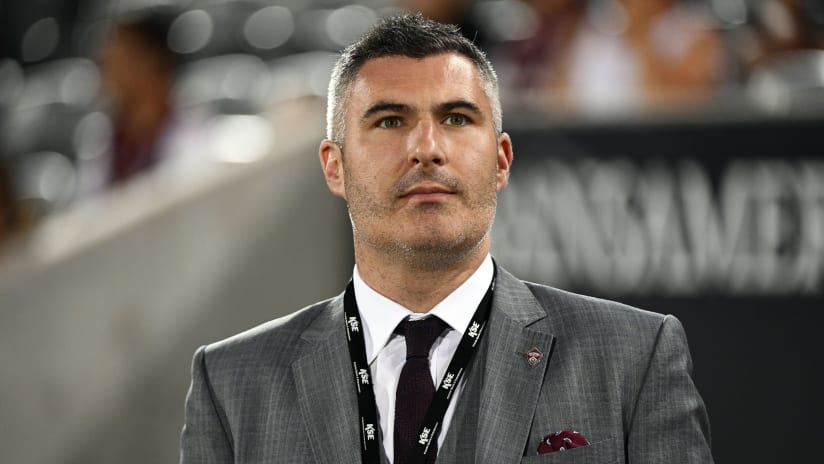Colorado executive VP and GM Pádraig Smith inherited a mess.
In his first full season leading the Rapids' technical staff, he didn’t make much visible progress cleaning it up.
Colorado were mostly miserable in 2018, finishing the season with the third-worst record, second-worst goal differential and fewest goals scored in all of MLS. Significant international signings Stefan Aigner, Yannick Boli and Joe Mason didn't pan out, and first-year head coach Anthony Hudson oversaw separate losing streaks of seven and eight games.
On the surface, it was hard to find positives. Behind the scenes, however, Smith feels Colorado took some steps forward. It didn’t translate into results, but he thinks Hudson successfully overhauled the culture in the locker room. The manager established a new, much-needed set of standards for every player on the roster and held firm to those standards no matter how bad things got on the field.
That led to a lot of short-term pain, but turning the Rapids into the entertaining, attacking team Smith dreams of is a long-term play. Last season was brutal, but Smith – who worked under technical director Paul Bravo and then club president Tim Hinchey before taking over as GM in July 2017 – thinks holding fast to their plan will pay dividends for Colorado down the road.
“We understand the results weren’t there last year, but we also had to make those changes,” Smith told MLSsoccer.com last week. “It’s hugely important that you stick to the plan in those cases. Could we have made short-term decisions last year, played a Yannick Boli, played a Stefan Aigner, got better short-term results but sacrificed the long-term plan? We could have, but we chose not to, and I firmly believe that that was the right decision.”
This season will be a good test of that belief. After whiffing on Aigner, Boli and Mason during his first few months in charge, Smith changed tactics this offseason. Instead of looking to Europe for his biggest reinforcements as he did last year, the Irishman focused on targets within MLS this winter. Seven of the 10 players acquired by Colorado this offseason came from within the league; the other three are rookies.
Several of those new acquisitions are notable, too. Colorado traded for forwards Kei Kamara and Diego Rubio, attacking midfielder Nicolás Mezquida and right back Keegan Rosenberry and signed midfielder Benny Feilhaber in MLS free agency. Smith said that Kamara, Rubio, Mezquida and Rosenberry were Colorado’s top targets in each of their respective positions. The Rapids didn’t know if Feilhaber would be interested in moving to Denver following his solid 2018 at LAFC, but Smith said they see his addition as “fantastic.”
Altogether, the moves completely remade the front-end of Colorado’s lineup. All five new signings will likely begin the season as starters, with Kamara leading the forward line, Rubio slotting in behind him, Mezquida playing the No. 10 and Feilhaber lining up alongside Kellyn Acosta and ahead of defensive midfielder Jack Price in Hudson’s preferred diamond midfield setup.
Importantly, the moves won’t tie Colorado’s hands in 2020. Kamara and Feilhaber are set to make significant money in 2019, but Feilhaber is on a one-year deal with a club option for 2020 and Kamara is on a two-year contract. Even if both players take a step back in 2019, a possibility considering they’ll both be 34 by the time the season starts, the Rapids aren’t tied to them for too long.
That’s huge, as next offseason will be even more important than this one for Smith and the Rapids. Designated Player Tim Howardannounced on Tuesday that he’ll retire following the 2019 season and fellow DP Shkëlzen Gashi, who underwhelmed severely last year, is out of contract and not expected to return. Smith wouldn’t comment on whether the Rapids would add a third DP this summer, but, even if they don’t, he’ll likely be able to make at least a pair of big-money signings next winter. Those will come in the attack and will likely be from South America, as Smith said he’ll spend a lot of time in 2019 searching for No. 10s in Argentina, Colombia and Uruguay.
“I think our investment level outside the salary cap is going to be on the attacking side of the field, I don’t think there’s any doubt about that at all. I think we’ve been very clear with that,” he said. “I think if you look at our acquisition strategy over the last number of years, we’ve done everything we can not to impact our flexibility to bring in long-term solutions in the attacking midfield area and in the striker area and that’s really important…. I think we need to bring in real quality in the attack. I think this offseason’s really seen us change that dynamic for the Rapids in the attacking third and we’ll continue to invest in those areas moving forward.”
It should be noted that the Rapids could’ve made the types of moves they made this offseason last winter, too. History has shown that signing players from within the league is usually a safer bet than acquiring players from abroad, particularly when those international signings are relatively expensive and haven’t played much in the few seasons prior to coming to MLS. That knowledge isn’t groundbreaking, and Colorado could've done it last winter.
That caveat doesn’t change Smith’s belief in his current group, however. After finishing last season 18 points out of the playoff places, he thinks the Rapids will contend for the postseason in 2019.
“We’re not going to shirk from what we’ve outlined,” he said. “We want to be a perennial playoff team and we firmly believe we’ve got the roster in place and the talent level there to be a playoff team in 2019.”




